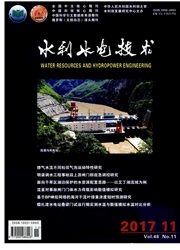

 中文摘要:
中文摘要:
人类活动下的水循环呈现“自然-社会”二元结构特征,水资源在原有的自然属性基础上增加了经济、社会等属性,水资源开发利用必须协调多维属性的均衡。从分析多维属性下的水资源高效利用调控需求和综合高效用水的概念人手,并从评判标准、评价尺度和评价范围等方面对比了传统节水与多维调控下的高效用水的区别,指出了水循环多维调控下的高效性需要对水循环的社会、经济、生态、环境的效应进行综合评判,促使水资源利用从低效端向高效端转变。在评价手段上,需要通过分析机理、构建流域水循环及伴生过程的综合模拟模型来量化分析不同属性的效率高低;在实施层面上,需要通过社会经济和生态环境等不同类型的调控要求,在点、线、面和流域整体等不同空间层次上提出调控措施。
 英文摘要:
英文摘要:
The water cycle under human activities is characterized by "nature-society" dual structure. Based on the original nature of the property, water resources increase the economic, social and other attributes, thus the development and utilization of water resources must coordinate the equilibrium of multidimensional attributes. This paper analyzes the concepts of the demand of efficient utilization of water resources and integrated water use under multidimensional attributes are analyzed, and compares the difference between tradition- al water-saving and high-efficient water use under the multi-dimensional control from the aspects of evaluation criteria, evaluation scale and evaluation scope. It is pointed out that the high efficiency under the multi-dimensional regulation of the water cycle requires a com- prehensive evaluation of the social, economic, ecological and environmental effects of the water cycle, so as to promote water use from low efficiency to high efficiency side. In the evaluation method, the high or low efficiency of different attributes can be quantified through the analysis mechanism and the establishment of basin water cycle and associated process simulation model. In the implementation level, based on the different types of regulatory requirements of the socio-economic and ecological environment, the control measures can be proposed from the point, line, surface and the whole basin and other different spatial levels.
 同期刊论文项目
同期刊论文项目
 同项目期刊论文
同项目期刊论文
 期刊信息
期刊信息
